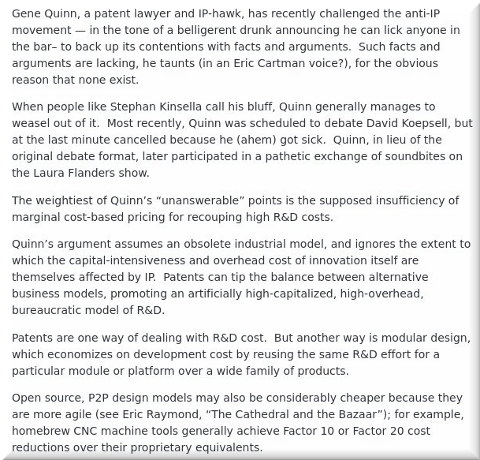

Reference: Gene Quinn (Watchtroll): Patent Twit of the Week
THE concept of patents is a controversial one, but only if one considers patents on things like thoughts, genetics (nature) and other stuff which doesn't constitute an invention. There have been studies about cause and effect and they are quite critical of the status quo.
"Now that the law 'industry' is large enough to have platoons of lobbyists there's a push to make everything a patent. That's a problem."We never opposed patents on physical things. "According to the terms of the agreement," said Floor Daily, "the parties agreed that the CMC patents are valid and enforceable."
We're talking about floors here. That's physical stuff.
And here's another new example from a manufacturing company. It's understandable that they're pursuing more patents. This one from yesterday is about Siemens. "In 2017," it says, "the university filed 106 U.S. patent applications, had 57 U.S. patents issued and saw a patent licensing income of nearly $4 million..."
"A system that loses sight of the importance of patent quality will simply render itself obsolete, over time (perishing in the public mind)."Siemens sells physical things for the most part. This is why Siemens is rarely mentioned here, except when it promotes software patents (that happened a very long time ago and never since).
How about this bunch of reports from last week regarding patents on drones? To quote: "An earlier patent application was for drones to monitor growing conditions of crops and send data to stores about when, and from where, the produce might arrive, Reuters said. So far, Walmart has applied for 46 drone technology patents, most of them for delivery and logistics, and for use within warehouses to track inventory."
Replacing some farmers with drones so that billionaires like the Waltons can get richer even faster may be an ethical/moral issue (see this response to ‘Innovation Kills Jobs’), but not the patents themselves are an issue. It's too easy to conflate these two things.
The California Institute of Technology v Broadcom Limited et al, a case which was noted a few days ago in Docket Navigator, speaks of physical things and primarily pertains to collection of evidence right now, notably:
The court denied plaintiff's motion to compel the production of a clawed back deposition exhibit and found the document was privileged.
Following a $30 million jury verdict and defendant's filing for bankruptcy, the court granted plaintiff's motion to amend its complaint to add defendant's co-owners as defendants along with alter ego and veil-piercing claims.
The court overruled plaintiff's objections to the magistrate judge's order partially striking the report of plaintiff's damages expert.